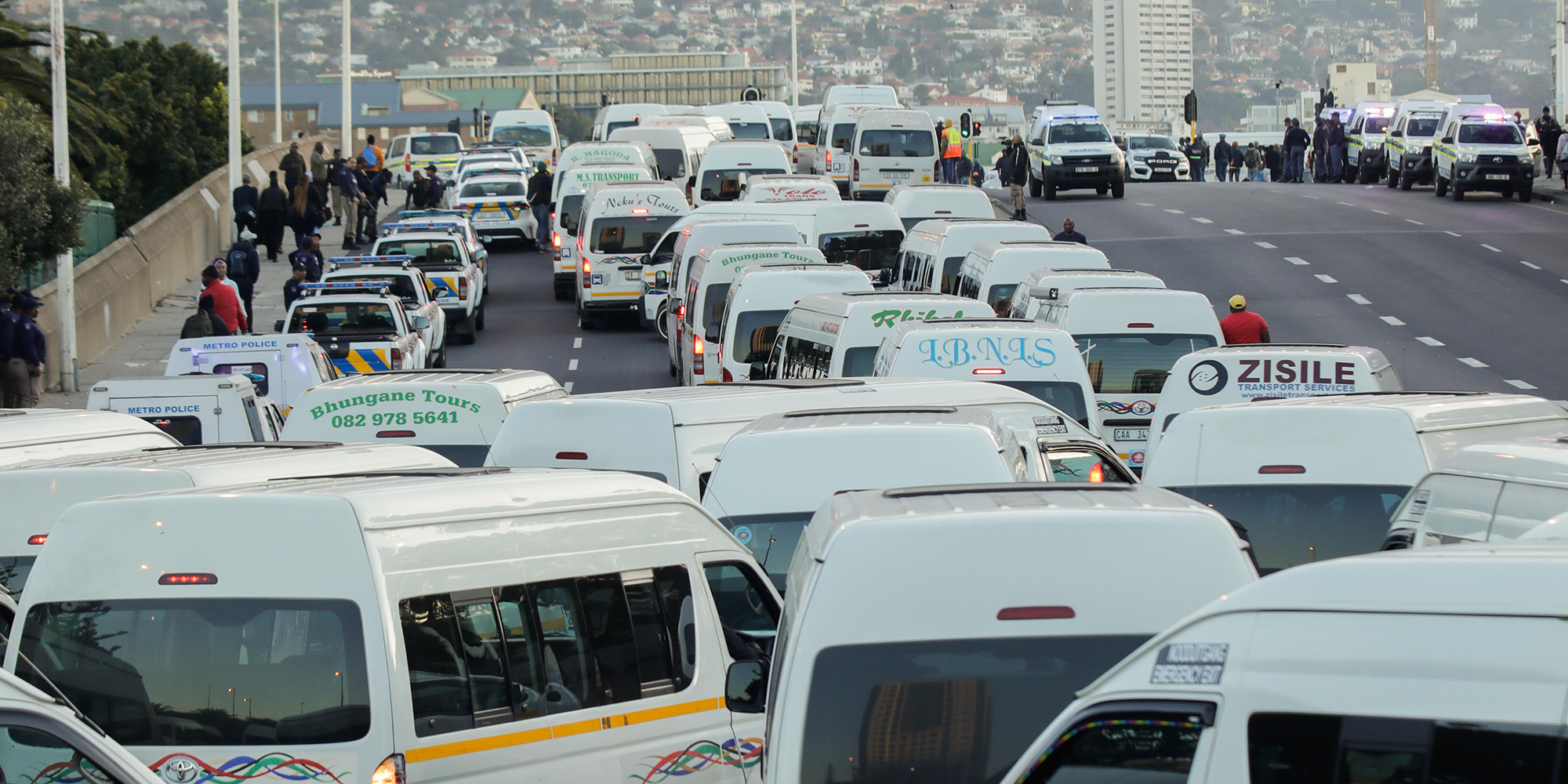Quicker processing of taxi operating licences, extortion and last year’s taxi strike were among the issues that Western Cape leaders of the South African National Taxi Council (Santaco) raised in a briefing to the provincial legislature on Friday.
The meeting was held just over a year after a devastating eight-day taxi strike in the Western Cape, which led to five deaths and affected thousands of commuters.
 Taxi drivers block a road near the Cape Town CBD on 1 August 2023. (Photo: Gallo Images / ER Lombard)
Taxi drivers block a road near the Cape Town CBD on 1 August 2023. (Photo: Gallo Images / ER Lombard)
 Cape Town commuters scramble for a bus at Golden Arrow Bus Station on 3 August 2023. Many people were stranded because of the Santaco taxi strike. (Photo: Shelley Christians)
Cape Town commuters scramble for a bus at Golden Arrow Bus Station on 3 August 2023. Many people were stranded because of the Santaco taxi strike. (Photo: Shelley Christians)
 Shops across Cape Town had no bread on their shelves due to the taxi strike in August 2023. (Photo: Ashraf Hendricks)
Shops across Cape Town had no bread on their shelves due to the taxi strike in August 2023. (Photo: Ashraf Hendricks)
Read more: Western Cape taxi strike
Santaco provincial chairperson Mandla Hermanus told the legislature’s standing committee on mobility that there were still issues with violence, route invasions and permits. He said some of these issues stemmed from “within the industry”.
Key themes that emerged included:
1) Operating licences
A big concern, Hermanus said, was delays in issuing taxi operating licences for new developments, which resulted in taxi drivers being fined by traffic authorities for operating on a route that had not yet been legalised.
Hermanus gave the example of Brackengate, an industrial area in the northern suburbs of Cape Town, where he said it took eight years for operating licences to be issued and finalised.
He asked for transportation plans to be settled as soon as construction began in a new development, as the industry was providing a “needed service”.
Santaco’s Western Cape general secretary, Ryno Saaiers, said that while e-hailing operators and charter operator permits were being called for, advocated and issued, the taxi industry had to beg for operating licences.
“Please give us recognition for the service we are providing,” said Saaiers.
Members of the provincial legislature asked why the City of Cape Town — a key stakeholder in the Western Cape public transport sector — was missing from the meeting.
Committee chairperson Dr Nomafrench Mbombo said the city had been invited to a previous meeting, which took place during the public participation process of the city’s contentious new taxi by-laws.
Read more: Cape Town considers stricter by-laws aimed at regulating ‘unhappy’ taxi industry
City officials would appear before the committee at a later date.
2) Masiphumelele scholar transport issues
In August, GroundUp reported on a letter that was sent by a local taxi association in Masiphumelele in Cape Town’s deep south saying that schoolchildren must use taxis rather than scholar transport to commute to and from school.
Committee member Dave Bryant (Democratic Alliance) asked for an explanation for this.
Godfrey Reed from the Department of Mobility said the letter was a draft — it had been “handwritten” — and circulated before it could be discussed. He said Santaco had distanced itself from the letter.
Hermanus said there was “always tension” between scholar transport providers and taxi associations, but that “there is scholar transport that co-exists” with taxi operators.
In the case of Masiphumelele, there was never an intention to give an ultimatum that learners could no longer use other transport.
“It’s just that the association was trying to deal with its own members”, Hermanus said.
3) Minibus Taxi Task Team
The Minibus Taxi Task Team, which consists of representatives from Santaco, the provincial government and the City of Cape Town, also came under the spotlight.
The task team deals with key operational and regulatory issues. Since its inception last year, it has assisted with funding models, training and reviewing issues around operating licences.
Reed described the task team as an “ideal platform to deal with issues proactively”.
Read more: Western Cape taxi task team sets four-week deadline to work out sticking points after imbizo breakthrough
4) Conflict resolution and input
Santaco asked for help with conflict resolution mechanisms within the industry. Hermanus said the Department of Mobility could play a “major role” in intervening in conflicts early on.
Mobility MEC Isaac Sileku said his ministry and the department were there to “work with” the industry.
He asked Santaco to provide the department with the business plans of new projects, which could assist in operating licence roll-outs for an area.
Read more: Cape Town taxi industry calls for more support and collaboration with government
5) Extortion
Hermanus said the rise in extortion and its perceived links to the taxi industry was the “elephant in the room”.
He said: “We taxi operators are sitting here; I don’t know what our vehicles or what the owners are doing now.”
Read more: Two Cape Town killer shootouts between cops and extortion suspects expose possible taxi industry links
A shout-out
Mbombo spoke extensively about the positives of the industry. She said that when she was the health MEC during the Covid-19 pandemic, “the taxi industry stood up” and transported health workers and patients alike.
“They came when no one else came,” she said about a successful project which saw the provincial government partnering with the industry to transport patients and healthcare workers during the pandemic. DM




 Shops across Cape Town had no bread on their shelves due to the taxi strike in August 2023. (Photo: Ashraf Hendricks)
Shops across Cape Town had no bread on their shelves due to the taxi strike in August 2023. (Photo: Ashraf Hendricks) 